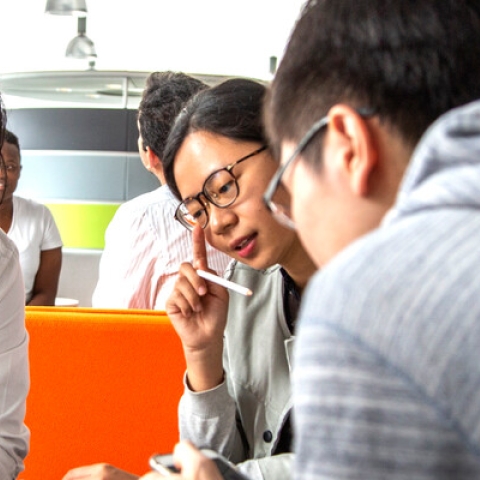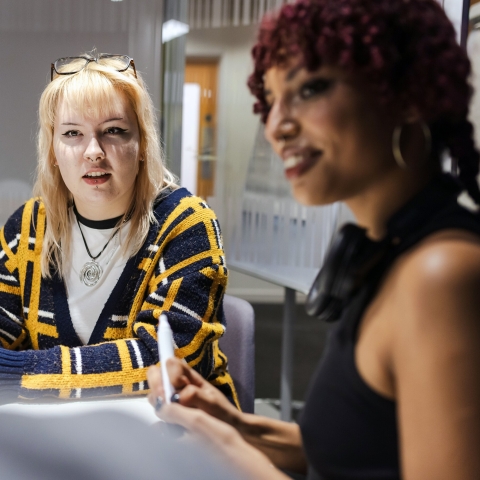
Studying at university can be very different to your previous studies.
Whether you're starting your degree straight after college, or you're returning to education as a mature student, adjusting to the different teaching and studying methods at university can be tricky. Among the types of study you'll experience are:
Lectures
During a lecture, your lecturer presents information to the class. They'll expect you to take your own notes on the subject as they speak.
It's a good idea to take a laptop or a notepad and pen to make your notes, and to put your phone on silent during your class. Lectures will improve your listening, note making and research skills and appear in most degrees.
Some lectures are followed by seminars on similar subjects where you'll be able to discuss and expand on the information you've been given – so it's important that you make good notes that you'll be able to understand outside of the lecture hall.
Lectures vary in size. Some subjects have classes of 25–30 people, but if lots of students study the same unit they may involve up to 300 people. Make sure you are on time. It can be off-putting for your lecturer and peers if you arrive late.
But whatever the size of the lecture, there's no reason to feel intimidated – everyone is in the same position as you.
Before, during and after lectures
The key to gaining the most out of lectures is preparation – the more informed you are beforehand, the more you will be able to engage with the concepts, questions and debates being presented and discussed.
Questions are an important element of lectures – it is vital for your learning that you question the ideas and concepts being presented to you, and also that you question your own ideas around areas of a topic. Through this questioning you will gain a deeper understanding of your subject.
What questions should I be thinking about to prepare for me lecture?
What topic is being presented in my next lecture?
I can check:
- Course Moodle unit
- Course unit overview
- Course handbook
What information can I find out about this topic before I attend the lecture?
I should read around the topic, especially looking at:
- Terminology
- Key names
- Key concepts
Where can I gather this information from?
I can check:
- Course reading lists
- Internet searches
- Terminology glossaries
- Pre-lecture notes and downloads
From the information I have found already, what questions have arisen that, given the opportunity, I could ask?
I should make a note of:
- Areas that have sparked an interest
- Ideas and concepts that I have not quite understood
- New terminology that I'm unsure of
During a lecture you will mainly listen to an educational talk on a particular topic to do with your subject. At the end of the lecture there might be time for discussion, and the opportunity to ask questions. However, this is not always the case. So it is important that, during the lecture, you listen and take notes on key concepts and ideas. You will then be able to use your notes to help you when doing independent study, for example. Those notes will also be useful if you are in a seminar group devoted to further discussion on the lecture – you can use them to clarify any points you didn’t quite understand, or terminology that is unfamiliar.
Your lecturer might spend time talking about key concepts that relate directly to something you were asked to read before attending a lecture – if you don’t prepare by reading pre-lecture materials you may find you have big holes in your understanding when in the lecture itself… preparation is key.
What questions should I be thinking about during a lecture?
What questions can I formulate from the information that is being presented?
I should consider:
- Ideas, concepts and terminology I'm unsure of
- Ideas and concepts that excite me and I want to find out more about
- Connections between my research for the lecture and the information being presented – has my research been effective enough?
Do I agree / disagree with the ideas being presented to me?
I should:
- Make a note of things I agree / disagree with. These thoughts and ideas will add to seminar debates around specific topics.
Is there any area of the topic presented that I would like to discover more about?
I should:
- Make a note of anything that sparked an interest – I can then develop my knowledge and understanding further.
After you have attended a lecture it is important to go over the notes you have made. You may want to spend additional time looking into areas you didn’t quite understand – talking to other students after the lecture can help when in this situation.
After a lecture, as part of my independent study, what activities should I undertake?
Read over and organise my notes
- What were the key concepts and ideas being presented?
- Did I understand them? If I didn't, I'll note them down and research further in my independent study.
Talk to my peers
- Talking over topics presented in a lecture with peers can help develop my understanding. Peers can offer different views and through discussion can open up new thoughts and ideas around specific topics.
Visit the Library
- Subject librarians can offer support and guidance.
Go online
- An internet search is a quick and easy way to get a grasp on key terms and concepts.
Engage with formative assessment
- If my lecturer has set an assessment / activity to test understanding of a topic then the assessment can help me gauge where I have a strong grasp of a topic and where I haven't... so I can know which areas I need to develop.
Activity - what do to around your lectures
In the grid there are 9 activities you'll need to complete either before, during or after your lecture. Drag and drop the tiles into the correct columns from the right-hand side, then click 'Check' when you're finished, to see how you did.
We are aware that this H5P component is not fully accessible. If you would like a copy of this item, please email websupport@port.ac.uk. Please also refer to our Accessibility Statement
Seminars
You should do any pre-seminar reading or research that your lecturer sets, so you can participate in the debate during your session. If you're unsure about some of the subject material, the seminar is your chance to ask your lecturer and peers to help.
To get the most out of your seminars. you'll need to play an active part in the discussion, and speak up when you have an opinion or idea. You can exchange views with your peers and discover new ideas and concepts that you hadn’t thought of before.
Don't worry if you feel nervous at first – everyone else will feel the same. Over time, you'll gain confidence and become better at sharing with your seminar group.
What will I learn by attending seminars?
Seminars improve your communication, teamwork and preparation skills. You'll learn:
- Subject-specific knowledge
- How to listen effectively and without interrupting
- Effective communication skills
- Confidence in speaking up and asking questions in groups
Independent study
Most of your time at university will be spent studying independently. Independent study happens outside of your timetabled ‘contact’ activities (lectures, seminars, tutorials and practicals) and includes the reading and research you undertake when you’re preparing for a lecture, writing an essay, or taking part in a group activity.
Independent study requires you to proactively search for information and then critically engage with it. When you're at uni, it'll be your responsibility to set your own study schedule, and to prioritise your workload. You should use a diary or calendar – either a paper one or a digital planner – to plan your studies.
To get the most out of your time you can visit the library, set up independent study groups with your peers, and access online resources. Studying independently will improve your research skills, critical thinking, problem solving, action planning, motivation and time management.
Being an effective independent learner
Choose the traits that make an effective independent learner from the options below. If you make the correct choice your answer will move to the top of the list and stay there.
Once you've finished you'll have a list of the most important traits of a successful independent learner. Compare these traits to your own attributes to figure out what you're good at and what you might need to work on.
We are aware that this H5P component is not fully accessible. If you would like a copy of this item, please email websupport@port.ac.uk. Please also refer to our Accessibility Statement
Group work
Being able to work well in a group is a skill that many graduate employers look for, and group assignments are a great way to show your ability to work in a group.
Groups are usually set up by your lecturer and can differ in size, although they're normally no larger than 10 people.
When you work in a group at uni, you'll have responsibility for specific tasks and develop valuable skills like teamwork, communication, collaborative working, thinking and time management.
Working in groups is a great way to gain collective ideas from your peers – individuals bring different perspectives to a problem which can help you consider different ways to completing your task. Group discussions can easily drift off topic, but every team member has something to bring to the project – so it’s important to give everyone the chance to voice their ideas.
You should turn up on time to organised meetings and be prepared for subject discussions. You should have any relevant work with you at the start of the meeting and be ready to focus and stick to the meeting plan.
Lab work and practical classes
Your degree may include practical classes depending on your course subject. You'll put your theoretical work into practice and develop your practical skills, communication and problem solving during these sessions.
Practical classes can be lab-based or computer-based, or involve clinical practice or fieldwork. Classes are typically directed by a tutor or lab technician and give you the chance to experience the dynamics of a workplace, and to practice skills you'll need to work in a similar environment after you graduate.
In these sessions, you'll learn subject-specific skills and techniques vital to your professional development. Depending on your discipline you may be assessed on your competency in learning and applying new techniques, and how you gather, record and analyse your data.
You may need to prepare before your practical classes, and you should check your course handbook to see if you need to bring any equipment or materials to your session. It's a good idea to take notes during practical classes, to help you evidence your work.
Online learning and collaboration
Online learning will play a big part in your studies, and you could find yourself using online tools to organise your time, manage notes, research key terms, access course materials, document your findings, share work, and talk with peers.
A huge number of online tools are available to help with this – the AppsAnywhere site helps University of Portsmouth students find apps to help them in their studies.
Tools for online learning
Working in groups
How to work as a team and plan ahead to give your group the best chance to succeed.

University terminology
When you start uni for the first time, you might come across words and terminology that you’ve not heard before. Here's a handy guide to some of the most common.

Enable University alerts
Turn on notifications for critical updates like closures, safety alerts, and urgent service disruptions.






